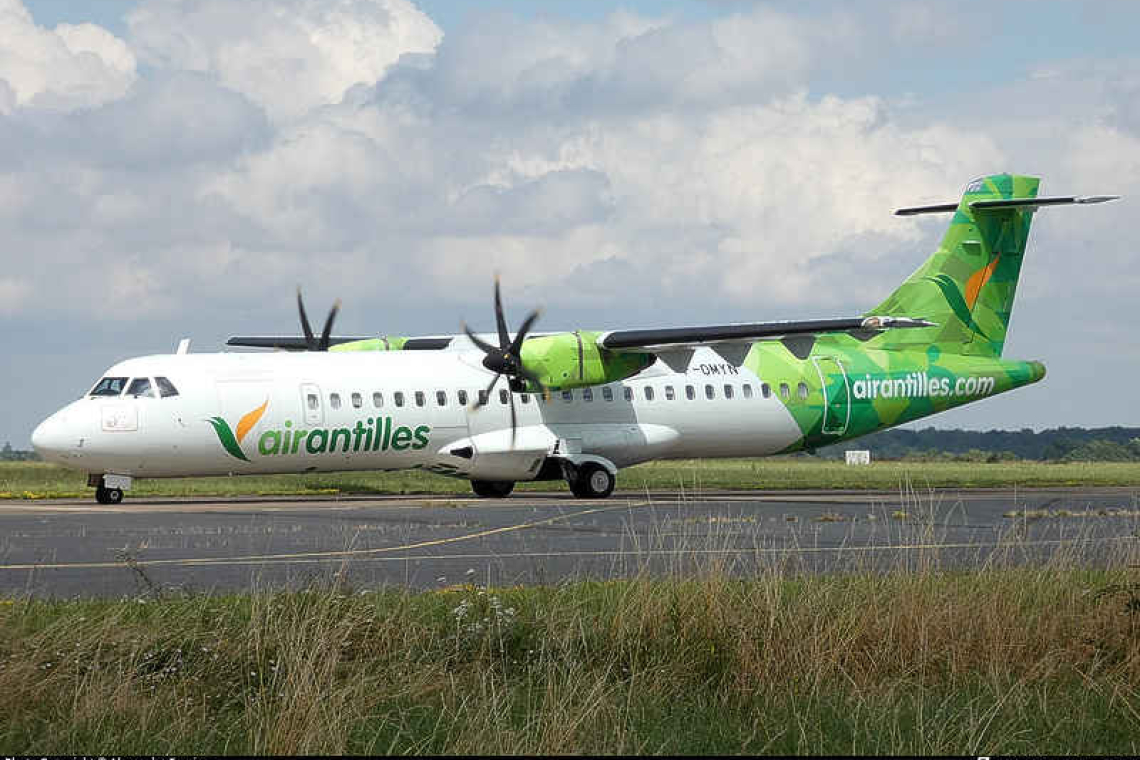Air Antilles ATR 72-600 (Photo: Alexandre Fevrier – Planespotters.net)
MARIGOT--The highly divisive subject of Air Antilles took centre stage at Monday’s re-scheduled Territorial Council meeting, with the main agenda point for the Council to approve a new three-million-euro loan to Air Antilles’ semi-public company, Société d’Economie Mixte (SEM), to head off spiralling expenses.
The loan would make it possible to seek refinancing in conjunction with the ongoing negotiations with investors.
It was finally adopted by the Council with 19 Councillors present. Seven voted for, seven voted against, and five abstained, with President Louis Mussington’s vote counting as a double vote.
Prior to the debate, Mussington, who is also the President of the Air Antilles administration board, and board members Alain Richardson and Valérie Damaseau left the hall, leaving Second Vice President Bernadette Davis in charge.
The terms of the 26-month loan are one million euros on signing the contract, one million advanced before the end of October, one million advanced before the end of November 2025.
On September 30 the civil aviation authority granted a further extension to Air Antilles’ operating licence for four months, until January 31, 2026, giving Collectivité President Louis Mussington extra time to find an investor; however, despite meetings and negotiations with potential investors, not one investor has been confirmed yet.
New investors are being sought to implement the growth and profitability that were envisaged and planned for the airline from the beginning.
According to the dossier given to Councillors to form their decisions, a refinancing loan must be granted at the same time as a new investor commits to the project, to enable the investor to make the investment.
Unfortunately, the time required to grant such a loan is one month, and the potential creditors likely to grant such a loan did not seriously examine the case before the licence was renewed for four months on September 30.
As a result, Air Antilles was unable to refinance itself for the coming month, with cash requirements exceeding 1.5 million euros per month (in the short term).
As a reminder, the financing plan for the takeover of Air Antilles initially provided for payment of 1.2 million euros to create the SEM’s capital, a payment of 6 million euros for the associated current account contribution and two payments of 6 million euros and 4 million euros to meet the obligations of the French Civil Aviation Authority for the company’s cash flow. This amounted to a total of 17.2 million euros.
The Collectivité of Saint-Martin holds 60% of the capital in Air Antilles and CIPIM, a company belonging to the EDEIS group at Grand Case Airport, has 40%. The airline employs 20 maintenance staff in Guadeloupe, 32 flight crew, 22 ground staff and 21 managers.
It is estimated that without Air Antilles operations, inter-island connections in the French Caribbean would be 32% lower than in 2019, creating a virtual monopoly and driving up prices,
Mussington indicated a private bank has also committed to providing a loan, but said due to the urgency there was not sufficient time to wait for that to come into effect.
He impressed on Councillors the importance and responsibility to save the airline: “It is crucial we protect the investment already made by the Collectivité in the airline and maintain the continuity of service to the population.”
Since taking over the airline, it has been far from smooth sailing for the Collectivité. The poor condition of the fleet required significant capital expenditure: The airline spent more than 3 million euros refurbishing the ATR planes.
The delay in the takeover led to losses due to personnel costs, and the necessary investments were financed by contributions from shareholders totalling 16.4 million euros to Air Antilles. CIPIM was slow to fulfil its commitments relating to the financing of the takeover (and did not comply with the business plan set out in the takeover bid).
Despite the contributions, the company faced significant cash flow requirements, leading to the accumulation of operating debts.
The Territorial Council session was due to take place on Friday, October 3, but was cancelled due to lack of a quorum.







